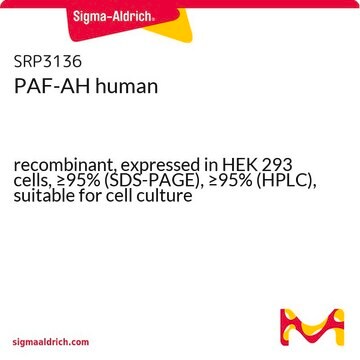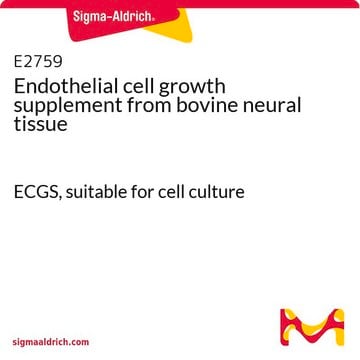P4904
β-Acetyl-γ-O-hexadecyl-L-α-phosphatidylcholine hydrate
≥98%
Synonym(s):
1-Hexadecyl-2-acetyl-sn-glycero-3-phosphocholine, 1-O-Palmityl-2-acetyl-sn-glycero-3-phosphocholine monohydrate, 2-Acetyl-1-hexadecyl-sn-glycero-3-phosphocholine, 3-sn-Phosphatidylcholine, 1-hexadecyl-2-acetyl, PAF(C16), Platelet activating factor
About This Item
Recommended Products
Quality Level
Assay
≥98%
form
powder
storage temp.
−20°C
SMILES string
O.CCCCCCCCCCCCCCCCOC[C@H](COP([O-])(=O)OCC[N+](C)(C)C)OC(C)=O
InChI
1S/C26H54NO7P.H2O/c1-6-7-8-9-10-11-12-13-14-15-16-17-18-19-21-31-23-26(34-25(2)28)24-33-35(29,30)32-22-20-27(3,4)5;/h26H,6-24H2,1-5H3;1H2/t26-;/m1./s1
InChI key
HFMSDOHEENWULV-UFTMZEDQSA-N
Looking for similar products? Visit Product Comparison Guide
Application
- to study its effects on phagocytic activity and production of superoxide anion in equine alveolar macrophage and blood neutrophils
- to study its protective effects against cisplatin-induced cell death in a human melanoma cell line in vitro
- to determine its effects on cervical ripening and leukocyte infiltration in rat models
Biochem/physiol Actions
Storage Class Code
11 - Combustible Solids
WGK
WGK 3
Flash Point(F)
Not applicable
Flash Point(C)
Not applicable
Personal Protective Equipment
Choose from one of the most recent versions:
Already Own This Product?
Find documentation for the products that you have recently purchased in the Document Library.
Customers Also Viewed
Our team of scientists has experience in all areas of research including Life Science, Material Science, Chemical Synthesis, Chromatography, Analytical and many others.
Contact Technical Service











